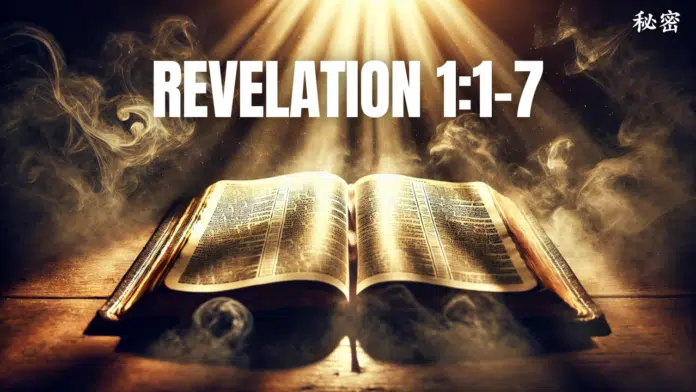
At Himitsu Ministries, our mission is to help you cultivate a deeper understanding of God’s Word primarily through bible prophecy and apologetics.
A study of the first 7 verses of Revelation 1. This study includes a discussion on the divine origin of the Book of Revelation, the various views of the 7 Spirits before the throne of God, the allusions to Daniel and Zechariah in verse 7, the divine council & ”Sons of God”, and more.
Timestamps
02:43 Focus of the Book of Revelation
05:00 Theme of the Book of Revelation
05:58 Verses 1 – 2
07:17 Verse 3
10:35 Verses 4 – 6
24:26 Verse 7
Show Notes: https://himitsustudy.com/revelation-1-verses-1-7/
Support the Ministry: https://donorbox.org/support-himitsu-ministries
Newsletterhttps://dashboard.mailerlite.com/form…
Follow Himitsu
Youtube: https://www.youtube.com/@HimitsuMinistries
Instagram:https://www.instagram.com/himitsuministries/
X: https://twitter.com/Himitsuministry
Facebook: https://www.facebook.com/himitsuministries/
Telegram: https://t.me/Himitsusministries

Listen to Other Episodes | Watch on YouTube
Episode Summary: A study of the first 7 verses of Revelation 1. This study includes a discussion on the divine origin of the Book of Revelation, the various views of the 7 Spirits before the throne of God, the allusions to Daniel and Zechariah in verse 7, the divine council & “Sons of God”, and more.
Scriptural References
- 7 Spirits of God (Isaiah 11:2-3, Revelation 5:6)
- Christ as faithful (2 Timothy 2:13)
- Hold fast (Revelation 22:7)
- Son of Man & Coming in the Clouds (Daniel 7:13-14; Matthew 24:30, 26:62-66)
- The Divine Council (Psalm 82:1)
- Every eye will see Him (Zechariah 12:10; Matthew 24:29-31)
- Riding on the Clouds (Deuteronomy 33:26; Psalm 68:32-33, 104:1-4; Isaiah 19:1; Revelation 14:15-16)
NKJV Cultural Backgrounds Study Bible Quotations
- “Intimations of the divine council in the Bible include the plurals in Gen. 1:26; 3:22; 11:7; Deut. 32:8…Job 1:6; 2:1; Is. 6:8 – but the passage in 1 Kin. 22 is the clearest attestation.”1
The Revelation of Jesus Christ Quotations
- “Dr. John Walvoord also speaks to the theme of the book, “The opening verse of the first chapter introduces immediately the central theme of the book of Revelation, namely, Jesus Christ in His present and future glory. The futuristic and prophetic character of the book is indicated in the words ‘a revelation of Jesus Christ’ in which God will declare to John ‘things which must shortly come to pass.’ The word revelation is the translation of apokalypsis without the article, meaning a ‘revelation, disclosure, or unveiling.’ It is a revelation of truth about Christ Himself, a disclosure of future events, that is, His second coming when Christ will be revealed.”2
- “That which Daniel declared would occur “in the latter days” is here described as ‘shortly’ (Gr., en tachei), that is, “quickly or suddenly coming to pass,” indicating rapidity of execution after the beginning takes place. The idea is not that the event may occur soon, but that when it does, it will be sudden (cf. Luke 18:8; Acts 12:7; 22:18; 25:4; Rom. 16:20)”3
- “Joining the Father in salutation are ‘the seven Spirits which are before his throne.’ Some have considered the term an allusion to the Holy Spirit (cf. Isa. 11:2-3). Others believe these were seven angels in places of high privilege before the throne of God (cf. 3:1; 4:5; 5:6)…Those who favor the seven spirits as referring to the Holy Spirit find justification in Isaiah 11. The message originates in God the Father and the Spirit.”4
- “In contrast to those who were previously restored to life only to die again, Christ is the Firstborn, the first to receive a resurrection body, which is immortal (cf. Acts 26:23). As Christ is ‘the firstborn of every creature’ (Col. 1:15), indicating that He was before all creation in time, so Christ was first also in resurrection…Compare a similar selective resurrection for the church (Phil. 3:11). As Christ is first (cf. ‘firstfruits,’ 1 Cor. 15:20) so others are to follow Christ in His resurrection.”5
Notes on Revelation Quotations
- “It will be vain to become occupied with ‘sevens,’ ‘hundred-forty-four-thousands,’ ‘six-sixty-sixes,’ the restoration of the Roman Empire, the person of the antichrist, the two wild beasts, the ‘millennium,’ or even the new Jerusalem; unless, along with God the Father, who has subjected all things unto Him, Christ is ever before our eyes!”6
- “The theme of the book is the ultimate victory of Jesus Christ over all enemies and the establishment of His earthly kingdom.”7
- “…the idea behind the Greek words translated ‘soon’ (en tachei) is probably that the events to be revealed could happen at any time without delay (cf. 22:16)”8
- “…the view that sees en tachei meaning ‘soon’ and thereby focuses on the imminence of the predicted events is impressive. A major thrust of Revelation is its emphasis upon the shortness of time before the fulfillment. In the midst of persecution God’s people do not have long to wait for relief to come. To say that the relief will come ‘suddenly’ offers no encouragement, but to say that it will come ‘soon’ does.”9
- “Verses 1 and 2 summarize the contents of the Book of Revelation and present them as the testimony that Jesus Christ bore concerning Himself. ‘The book contains the word of God as well as the testimony of (or about) Jesus Christ in His role as Judge of the churches (chaps. 2—3), of the inhabitants of planet earth (chaps. 6—19), and of the lost of all the ages (chap. 20). In the subsequent chapters (21—22), the effects of His judgments are seen in the new heavens and new earth.'”10
- “John actually wrote to seven Churches, but the very completeness of the number seven indicates that his message is to the whole Church, and is still meant for us today.”11
- “The seven Spirits who are before’ God’s ‘throne’ may refer to the seven angels of the seven churches (chs. 2—3) or to seven principal angelic messengers (cf. v. 20; 8:2, 6; 15:1; 1 Kings 22:19-21; Heb. 1:14)…Another popular possible view is that the phrase refers to the Holy Spirit in His fullness (cf. 5:6; Isa. 11:2-3; Zech. 4:2-7). If so, this title fills out a reference to the Trinity in this sentence (cf. 3:1, 4:5; and 5:6)”12
- “This great text announces the climactic event in Revelation, namely, the return of Jesus Christ to the earth at His second coming (19:11-16). All that intervenes between this verse and 19:11 through 16 leads up to that event…”13
The Old Testament in Revelation Quotations
- “Scholars are in general agreement about where John gets the phrase. Sean McDonough has traced the phrase, related antecedents, and parallels in Hebrew, Aramaic, and Greek material preceding and following the New Testament. He writes, “It has long been recognized that this description of God is indebted to Jewish reflection on the name YHWH, and in particular to reflection on the enigmatic words of Exodus 3:14 ‘I am who I am’.” The overlap between the divine name in Exodus 3 and the initial element of John’s wording is at once discernible…John has lifted the wording he uses from LXX Exodus 3:14 and has not changed the grammatical case endings when inserting the phrase into Revelation 1:4a after the preposition. He did so deliberately to draw attention to his source text, Exodus 3:14, the divine name revelation at the burning bush. Consequently, with respect to the source, it is clear that Exodus 3:14 is John’s source.”14
- “The conclusion toward which this points is that the LXX translator rendered the divine name in Exodus 3:14 the way he did to challenge the status of Zeus, or perhaps less confrontationally, to assert that Yahweh of Israel was the true Most High…On the other hand, the two additional phrases would have been recognized as an assertion to anyone familiar with epithets of Zeus that John was making a specific, bold, theological claim in the Greco-Roman world: that the God of Israel was what Zeus claimed to be, the one who is, was, and who is coming. That is, the God of Israel is the source of true existence, who existed from eternity, and will always exist, not Zeus. As such, the God of Israel is the true Most High.”15
- “Readers familiar with Daniel 7, a divine council meeting (7:9-10) to determine the fate of the four beasts/ empires (7:1-8) will readily note that John is alluding to the passage….[Some] things jump out at us right away. First, we know that the Ancient of Days is the God of Israel because the description of his throne as fiery and having wheels matches that of the vision of Ezekiel 1. Ezekiel’s vision also included a human figure on the throne of God (Ezek. 1:26-27). Second, there are many thrones in heaven, not just one (‘thrones were set up”). These thrones mark the presence of the divine council.”16
- “As Daniel 7 continues, readers are introduced to the son of man, who is distinct from the Ancient of Days…In Daniel 7, it is the Ancient of Days whose clothing ‘was like white snow and the hair of his head was like pure wool.’ There is no doubt that this is the God of Israel, for, as noted above, the description draws on Ezekiel 1, where the embodied Yahweh is on the throne. The description of one coming with upon the clouds is significant, for this was a known title of full deity (Baal).”17
- “In Revelation 1:7 the ‘coming on the clouds’ idea is applied to Jesus…The identification is made secure by the added phrase ‘every eye will see him, even those who pierced him,’ which comes from Zechariah 12:10, a passage the Gospel of John cites of the crucifixion (John 19:37)…John proceeds in verses 12-15 to identify the son of man with Yahweh himself, the Ancient of Days. In effect, he fuses the imagery of the two into one. Specifically, the Ancient of Days imagery applied to the son of man comes in Revelation 1:14 (‘The hairs of his head were white, like white wool, like snow’).”18
Referenced Materials
- Divine Council, NKJV Cultural Backgrounds Study Bible, pg 642 ↩︎
- The Revelation of Jesus Christ (Introduction: The Things Which Thou Hast Seen) by Dr. John F. Walvoord ↩︎
- Ibid ↩︎
- Ibid ↩︎
- Ibid ↩︎
- Notes on Revelation by Dr. Thomas L. Constable ↩︎
- Ibid ↩︎
- Ibid ↩︎
- Ibid ↩︎
- Ibid ↩︎
- Ibid ↩︎
- Ibid ↩︎
- Ibid ↩︎
- The Old Testament in Revelation by Dr. Michael S. Heiser, pgs 10-11 ↩︎
- Ibid, 12-13 ↩︎
- Ibid, 25 ↩︎
- Ibid, 25-26 ↩︎
- Ibid, 26 ↩︎
The Gospel
We’ve all sinned and fallen short of the glory of God (Psalm 51:5, Romans 3:23). Because God is Holy he must judge sin. The penalty of this sin is death and ultimately the Lake of fire (Romans 6:23, Revelation 20:11-15). There’s nothing we can do to save ourselves (Isaiah 64:6).
But God, in his love has provided a way to escape his wrath through Christ (John 3:16-18, John 14:6). Jesus paid for our sin penalty by taking God’s wrath in our stead on the cross (Romans 5:8). He died for our sins, was buried, and rose again 3 days later (1 Corinthians 15:1-5).
You can accept this free gift of salvation by believing in Christ (Acts 16:30-31, Romans 6:23, Ephesians 2:8-9). Make sure you’ve made the right decision about Jesus today (2 Corinthians 6:2)! It will be the most important decision of your life, for eternal life.




 Support the Ministry
Support the Ministry